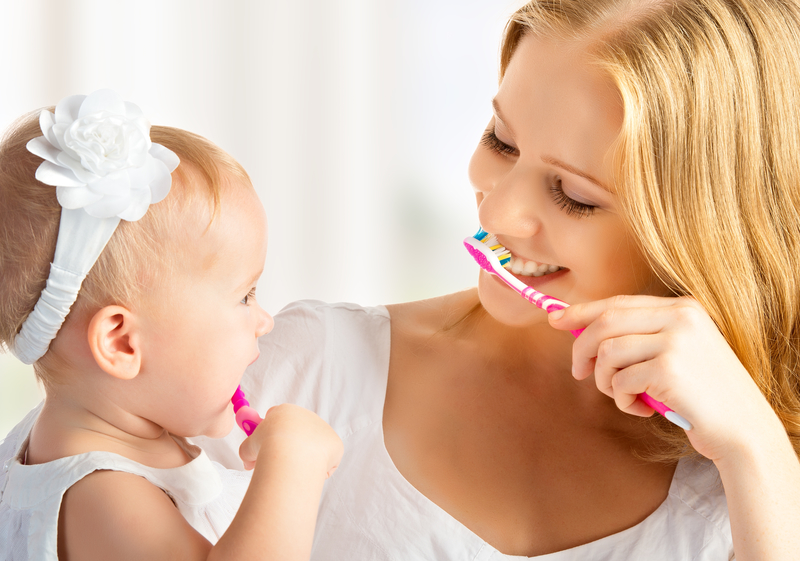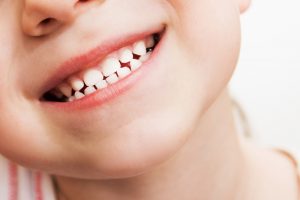Why the Baby Teeth Are Important
Oral Milestones in Your Child’s Life
February 12, 2018Making Dental Visits Easy on Kids
February 26, 2018
Did you know that there are only 20 baby teeth in children but many more teeth in adults? A child’s mouth is continually growing and their jaw forming well into their early teen years. A child only has baby teeth for a few years of their life. However, those teeth are prone to tooth decay and should still be taken care of for those years. Children must practice good oral hygiene just as much as adults, or cavities will weaken their smile. The baby teeth are very important in a child’s development and have their purpose when it comes to preparing the mouth for the permanent teeth. Find out why each baby tooth is important and how to care for them properly!
Why Are Baby Teeth So Important?
Everyone knows that children will have teeth that will eventually fall out. Getting teeth is an exciting time for a toddler, but it’s also a painful time. Teething can be hard for babies. Fast forward a few years and your child will start the process of getting teeth all over again when the baby teeth start to fall out. However, even though those teeth will fall out, they are essential to your child’s oral health and development. Infants are not born with teeth in their mouth. They generally start to get their first tooth between 4 and 9 months. However, there are many cases of infants getting their teeth at 3 months or not having teeth still at 15 months. However, your child should have their baby teeth before they are 3 years old.
Babies will get their bottom two teeth first, followed by the upper two teeth. This pattern will continue both in the upper and lower jaws until your baby has 20 baby teeth. Just like adults, your child will have incisors and molars in their mouth. These will just be smaller than adult teeth. Even though children only have 20 baby teeth, they will have 32 permanent teeth as an adult. The baby teeth will be small, are a bit more spaced out than adult teeth and they take several years to all come in.

Bite and Alignment
One of the most important things to watch for in a growing child is how their bite lines up. Orthodontists and dentists are trained to watch for patterns in a growing child’s mouth. We know that the upper and lower jaws are supposed to line up with one another, with the upper front teeth only slightly in front of the lower front teeth. If your child’s bite and alignment are good as a child, then the permanent adult teeth can come in correctly. The baby teeth are there to be small when your child is small, but also to eventually make way for adult teeth to come in. The baby teeth generally fall out in the order that they came into the mouth.
When they start to fall out around age 6 or 7, permanent teeth will start to come in and will all be in the mouth by age 13. There will be more teeth as well, as the jaw has grown to make more room for more teeth as your child has grown. If the teeth don’t line up as they are supposed to, it can cause problems later on with eating, speaking, chewing, broken or cracked teeth and more. However, problems with bite and alignment can be corrected easily through child orthodontics, which is braces for children. If your child sees the dentist when young, bite and alignment problems can be caught early.
First Infant Dental Exam
Did you know that infants and toddlers need to visit the dentist too? The American Dental Association recommends that everyone see the dentist for exams and cleanings at least twice a year. These visits are critical for finding tooth decay, gum disease, oral cancer and other chronic conditions before they become severe. Adults have these conditions at an increasingly alarming rate. However, children have problems such as tooth decay and gum disease too. The American Academy of Pediatric Dentistry recommends that children be seen for an exam as early as 1 year of age or within 6 months of the eruption of the first baby tooth.
As soon as that tooth pops through the gums, it is at risk for decay. This is especially true of babies who drink milk, as milk contains sugars that can decay a delicate baby tooth. We offer a free first infant dental exam for patients under 18 months. This is an opportunity for Dr. Nam to examine your child’s mouth and baby teeth for problems and to help teach you how to care for your child’s baby teeth. Your baby even gets to stay in your lap during this examination, which makes it a good experience for your baby instead of a scary one.

Schedule Your Child’s Appointment
We know that you want the best for your little one. Starting your child off with a dental exam and continue having dental exams and cleanings throughout their life. This will help them avoid tooth decay and other oral health issues. If you have a baby has one or more teeth, come into our office for a quick and gentle dental exam. Simply call Hardy Pediatric Dentistry & Orthodontics today at (720) 887-6003 for your free consultation and appointment.